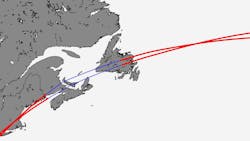NASA and DLR jointly developing quantum computer software package
WASHINGTON - The United States' National Aeronautics and Space Administration (NASA) has announced an agreement with the German Aerospace Center (DLR) to jointly develop open source software for quantum computers to solve real-world aerospace applications. DLR and NASA announced the partnership earlier this year.
The DLR established a Quantum Computing research group in 2015 as part of its High-Performance Computing department and has published a software module that has been used to explore quantum computing approaches for tasks such as optimizing routes for transatlantic flights, allocating aircraft at major airports or planning satellite missions. NASA and DLR are now developing further modules and will subsequently make them available as open-source software.
"Quantum computers promise extreme runtime improvements for certain application problems that cannot currently be solved with conventional computers," DLR wrote of quantum computing for its Institute for Software Technology. "While computational tasks on classical computers are processed with bits that have either the state zero or one, quantum computers operate on the basis of qubits that can assume many different states simultaneously. Algorithms that make optimal use of these properties can demonstrate an advantage over classical algorithms."
The partners are continuing to work on the DLR group's software module. The module serves as an interface for the transfer of industrial planning problems to quantum computers. It was developed in the Enabling QUAnTum AdvantagE (EQUATE) project.
The project is investigating whether a certain problem can be solved faster on a state-of-the-art quantum computer than on a conventional computer. It is also looking at how quantum computers can be efficiently used in combination with conventional computers.
"As one of the first and world-leading research groups for application-oriented quantum computing research, NASA's research group, the Quantum Artificial Intelligence Laboratory (QuAIL), is an attractive cooperation partner for DLR. There are many similarities with DLR's research goals and use cases," says Tobias Stollenwerk, head of the Quantum Computing Research Group at the DLR Institute for Software Technology in Cologne. DLR and NASA have been conducting joint research on quantum computing since 2016. This cooperation will now be strengthened. Among other things, software is to be further developed to support the creation of new quantum computer algorithms. There is also a focus on software for compiling and error suppression in computing processes.

Jamie Whitney
Jamie Whitney joined the staff of Military & Aerospace Electronics and Intelligent Aerospace. He brings seven years of print newspaper experience to the aerospace and defense electronics industry.
Whitney oversees editorial content for the Intelligent Aerospace Website, as well as produce news and features for Military & Aerospace Electronics, attend industry events, produce Webcasts, oversee print production of Military & Aerospace Electronics, and expand the Intelligent Aerospace and Military & Aerospace Electronics franchises with new and innovative content.

